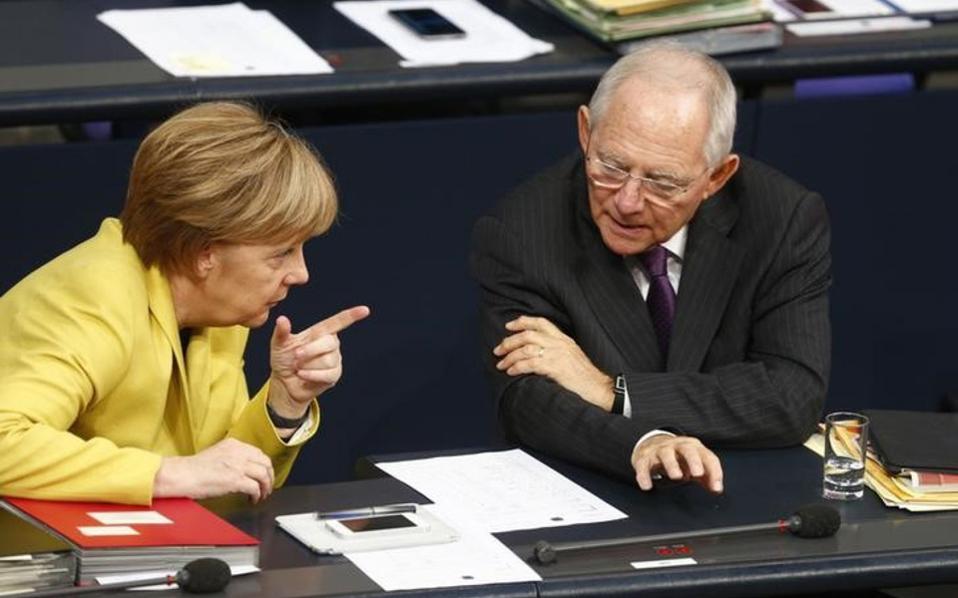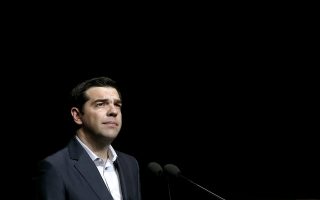Awkward alliance running Germany exposed by Greek crisis

In 2000, Angela Merkel pushed past Wolfgang Schaeuble on her way to the top of the political ladder. As finance minister, he’s won her pledge of a free hand in policy making in exchange for his loyalty.
Now the awkward alliance that forms the core of Europe’s financial crisis-fighting effort is under its biggest strain yet. As officials prepare a third Greek bailout, Merkel is holding fast to the view that the 19-member currency union must stay intact. Schaeuble has pushed back, dangling the threat of expulsion to what he considered an untrustworthy government.
“Merkel and Schaeuble operate according to different logic,” Andrea Roemmele, a political scientist at the Hertie School of Governance in Berlin, said by phone. For Merkel, “to some extent it’s about her legacy” as German chancellor at a time of crises, “and that’s something that Schaeuble just doesn’t think about,” she said.
The mostly cordial entente between the two has dragged skeptical lawmakers to back bailouts that about half of Germans oppose. The cantankerous Schaeuble has given voice to backbenchers’ doubts, while Merkel has reminded Germany of its unique responsibility in holding the euro together. Ultimately, Germany has provided the biggest share of almost half a trillion euros ($547 billion) of aid offered to five euro-area countries in the past five years.
“Merkel and Schaeuble are singing from the same sheet, but they’re singing different melodies,” said Fredrik Erixon, head of the European Centre for International Political Economy in Brussels. “It falls to the finance minister to be the bad guy.”
Strains emerge
Their roles have been further strained by Schaeuble’s evident distaste for Greek Prime Minister Alexis Tsipras’s Germany-bashing. That has deepened questions about Greece’s ability to repay its debt. At issue for Merkel is cutting loose a NATO ally in a region vulnerable to Vladimir Putin’s increasingly aggressive foreign policy.
The conflict between the two played out during three days of European diplomacy in Brussels this month, where Merkel’s view that Greece can’t be suspended from the euro without its consent carried the day amid pressure from France and Italy. That unlocked a deal on July 13 to begin talks on a third bailout tied to further austerity for Greece.
Though some speculated that Schaeuble floated the option of suspending Greece on his own to his fellow finance ministers, German government officials said it was coordinated with Merkel. Schaeuble simply sees it as the preferable option because a Greek debt writedown isn’t on offer, according to one official, who asked not to be named discussing deliberations within the government.
Greece’s debt
Schaeuble made his point one more time on Thursday, telling a German radio station that temporarily leaving the euro “might be better” for Greece. The next day, he was the loyal minister again, lobbying Germany’s parliament to back the mandate for aid talks. Merkel’s coalition passed the measure, though 60 of her 310 lawmakers dissented.
The open disagreement prompted a bout of speculation that Schaeuble might quit, which he quashed. As talks on Greece’s debt and its next bailout move forward, tension between him and Merkel risks erupting again.
It would be another twist in a long road for two politicians defined by divergent backgrounds.
Merkel, the unassuming physicist who grew up in communist East Germany, was on the sidelines of history when Schaeuble helped negotiate the reunification of East and West Germany in 1990. That year, he was shot by a mentally disturbed gunman at an election rally in his home region of Baden-Wuerttemberg, near the French border, leaving him paralyzed from the chest down and in a wheelchair.
Held back
Helmut Kohl, the chancellor who presided over reunification and gave Merkel her first Cabinet post, anointed Schaeuble as his successor. That plan fell apart after Schaeuble, who once worked as a state tax official, was implicated in a party financing scandal that embroiled Kohl after he left office. Schaeuble quit as CDU chairman in 2000, Merkel took over and when she won the chancellorship five years later, she asked him to join her Cabinet.
Schaeuble has been there ever since, seeing Merkel become Europe’s most powerful leader. He’s her lightning rod with lawmakers whose constituents are fed up with Greece.
Merkel “needs a strong finance minister at her side” who “is thinking about a solution in case negotiations with Greece fail,” said Mark Hauptmann, a first-term lawmaker for Merkel’s Christian Democratic Union from former East Germany. “Wolfgang Schaeuble enjoys tremendous trust in the parliamentary group.”
Independent mind
For all their teamwork, Schaeuble has endured repeated slights at Merkel’s hands.
In 2004, he was a contender to become German president, a mostly ceremonial post. Merkel, then opposition leader, thwarted Schaeuble and successfully backed former International Monetary Fund head Horst Koehler.
During Europe’s debt crisis in 2010, Merkel overruled Schaeuble, now finance minister, by calling in the IMF to help rescue Greece. He argued Europe could handle the crisis alone.
In his latest turn as Greek crisis negotiator, Schaeuble has edged ahead of Merkel in some polls. Sixty-four percent of respondents approve of his approach to the talks, while 62 percent said the same about the chancellor, according to an Infratest poll for ARD television published July 13.
“The chancellor and I don’t play roles,” Schaeuble told Der Spiegel magazine. “That’s not the chancellor’s style, nor is it mine. Each of us has our convictions.”
Asked whether he was considering resigning, he said, “No, where did you get that idea?”
[Bloomberg]



